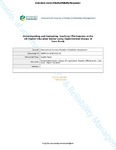Understanding and Evaluating Teaching Effectiveness in the UK Higher Education Sector using Experimental Design: A Case Study
| dc.contributor.author | Antony, J | |
| dc.contributor.author | Karamperidis, Stavros | |
| dc.contributor.author | Antony, FJ | |
| dc.contributor.author | Cudney, EA | |
| dc.date.accessioned | 2018-04-06T17:37:32Z | |
| dc.date.issued | 2019 | |
| dc.identifier.issn | 0265-671X | |
| dc.identifier.uri | http://hdl.handle.net/10026.1/11235 | |
| dc.description.abstract |
<jats:sec><jats:title content-type="abstract-subheading">Purpose</jats:title><jats:p>The purpose of this paper is to demonstrate the power of experimental design as a technique to understand and evaluate the most important factors which influence teaching effectiveness for a postgraduate course in a higher education (HE) context.</jats:p></jats:sec><jats:sec><jats:title content-type="abstract-subheading">Design/methodology/approach</jats:title><jats:p>The methodology involves the execution of a case study in the form of an experiment in a business school setting. The experiment was carried out with the assistance of over 100 postgraduate students from 26 countries. The data were collected over a two year period (2015 and 2016) from a postgraduate course offered by the same tutor for repeatability reasons.</jats:p></jats:sec><jats:sec><jats:title content-type="abstract-subheading">Findings</jats:title><jats:p>The key findings of the experiment have clearly indicated that students’ perceptions of teaching effectiveness based on intuition and guesswork are not identical to the outcomes from a simple designed experiment. Moreover, the results of the experiment provided a greater stimulus for the wider applications of the technique to other processes across the case study HE sector.</jats:p></jats:sec><jats:sec><jats:title content-type="abstract-subheading">Research limitations/implications</jats:title><jats:p>One of the limitations of the study is that the experiment was conducted for a popular postgraduate course. It would be beneficial to understand the results of the experiment for less popular postgraduate courses in the university in order to drive improvements. Moreover, this research was conducted only for postgraduate courses and the results may vary for undergraduate courses. This would be an interesting study to understand the differences in the factors between undergraduate and postgraduate teaching effectiveness.</jats:p></jats:sec><jats:sec><jats:title content-type="abstract-subheading">Practical implications</jats:title><jats:p>The outcome of this experiment would help everyone who is involved in teaching to understand the factors and their influences to improve students’ satisfaction scores during the delivery of teaching.</jats:p></jats:sec><jats:sec><jats:title content-type="abstract-subheading">Originality/value</jats:title><jats:p>This paper shows how experimental design as a pure manufacturing technique can be extended to a HE setting.</jats:p></jats:sec> | |
| dc.format.extent | 202-216 | |
| dc.language | en | |
| dc.language.iso | en | |
| dc.publisher | Emerald | |
| dc.rights | Attribution-NonCommercial-NoDerivatives 4.0 International | |
| dc.rights | Attribution-NonCommercial-NoDerivatives 4.0 International | |
| dc.rights | Attribution-NonCommercial-NoDerivatives 4.0 International | |
| dc.rights | Attribution-NonCommercial-NoDerivatives 4.0 International | |
| dc.rights | Attribution-NonCommercial-NoDerivatives 4.0 International | |
| dc.rights | Attribution-NonCommercial-NoDerivatives 4.0 International | |
| dc.rights | Attribution-NonCommercial-NoDerivatives 4.0 International | |
| dc.rights.uri | http://creativecommons.org/licenses/by-nc-nd/4.0/ | |
| dc.rights.uri | http://creativecommons.org/licenses/by-nc-nd/4.0/ | |
| dc.rights.uri | http://creativecommons.org/licenses/by-nc-nd/4.0/ | |
| dc.rights.uri | http://creativecommons.org/licenses/by-nc-nd/4.0/ | |
| dc.rights.uri | http://creativecommons.org/licenses/by-nc-nd/4.0/ | |
| dc.rights.uri | http://creativecommons.org/licenses/by-nc-nd/4.0/ | |
| dc.rights.uri | http://creativecommons.org/licenses/by-nc-nd/4.0/ | |
| dc.title | Understanding and Evaluating Teaching Effectiveness in the UK Higher Education Sector using Experimental Design: A Case Study | |
| dc.type | journal-article | |
| dc.type | Journal Article | |
| plymouth.issue | 2 | |
| plymouth.volume | 36 | |
| plymouth.publication-status | Published | |
| plymouth.journal | International Journal of Quality and Reliability Management | |
| dc.identifier.doi | 10.1108/IJQRM-01-2018-0011 | |
| plymouth.organisational-group | /Plymouth | |
| plymouth.organisational-group | /Plymouth/Faculty of Arts, Humanities and Business | |
| plymouth.organisational-group | /Plymouth/Faculty of Arts, Humanities and Business/Plymouth Business School | |
| plymouth.organisational-group | /Plymouth/REF 2021 Researchers by UoA | |
| plymouth.organisational-group | /Plymouth/REF 2021 Researchers by UoA/UoA17 Business and Management Studies | |
| plymouth.organisational-group | /Plymouth/Users by role | |
| plymouth.organisational-group | /Plymouth/Users by role/Academics | |
| dcterms.dateAccepted | 2018-03-01 | |
| dc.rights.embargodate | 2019-4-10 | |
| dc.rights.embargoperiod | Not known | |
| rioxxterms.versionofrecord | 10.1108/IJQRM-01-2018-0011 | |
| rioxxterms.licenseref.uri | http://creativecommons.org/licenses/by-nc-nd/4.0/ | |
| rioxxterms.licenseref.startdate | 2019 | |
| rioxxterms.type | Journal Article/Review |



